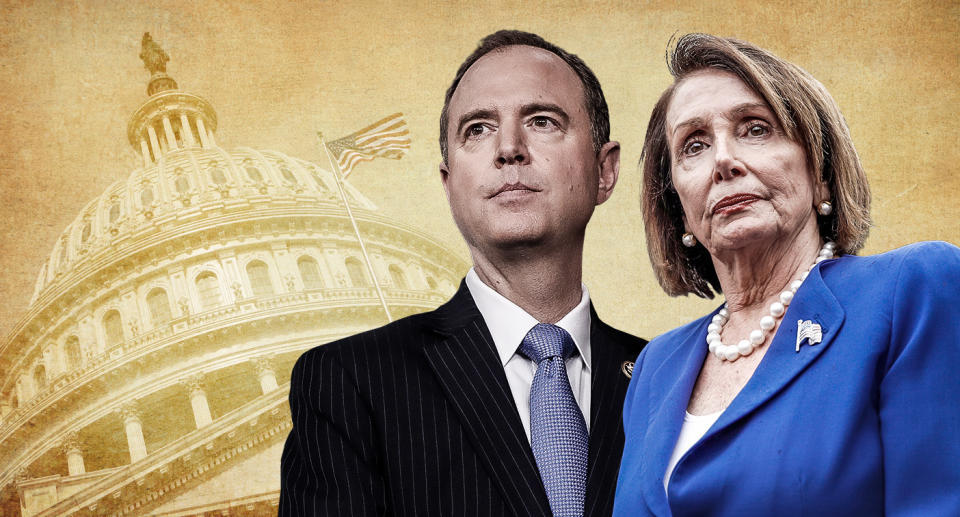House approves Trump impeachment resolution, paving way for public hearings
The House of Representatives passed a resolution Thursday that formalizes the next steps in the impeachment inquiry into President Trump. The final vote was 232-196, with former Republican and current independent Rep. Justin Amash voting yes and two Democrats voting no.
The measure, which came after weeks of Republican criticism of Democrats for conducting interviews behind closed doors, signals the beginning of public hearings in which staff counsel for both parties will be given equal time to question witnesses.
“Sadly, this is not any cause for any glee or comfort. This is something that is very solemn, that is something prayerful and that we had to gather so much information to take us to this next step,” said Speaker Nancy Pelosi on the House floor prior to the vote, adding, “Every member should support allowing the American people to hear the facts for themselves. That is really what this vote is about.”
Live updates: House passes impeachment resolution
Trump reacted to the vote with a familiar refrain.
The Greatest Witch Hunt In American History!
— Donald J. Trump (@realDonaldTrump) October 31, 2019
White House press secretary Stephanie Grisham portrayed the vote as a partisan exercise.
“The President has done nothing wrong, and the Democrats know it. Nancy Pelosi and the Democrats’ unhinged obsession with this illegitimate impeachment proceeding does not hurt President Trump; it hurts the American people,” Grisham said in a written statement.
House Intelligence Committee Chairman Adam Schiff, D-Calif., who has led the impeachment inquiry to date, referenced the Founding Fathers when speaking of the need to hold Trump accountable.
“This is a solemn day in the history of our country, when the president’s misconduct has compelled us to continue to move forward with an impeachment inquiry,” Schiff said at a news conference held following the passage of the measure, adding, “The Founding Fathers understood that a leader might take hold of the Oval Office who would sacrifice the national security, who would fail to defend the Constitution, who would place his personal and political interests above the interests of the country. They understood that might happen, and they provided a mechanism to deal with it, and that mechanism is called impeachment.”
The two Democrats to vote no were Rep. Jeff Van Drew of New Jersey and Rep. Collin Peterson of Minnesota.
Since late September, House Democrats have been building their case that Trump abused his powers as president by asking the president of Ukraine to announce an investigation of one of his political rivals, former Vice President Joe Biden, and to cooperate with Trump’s lawyer Rudy Giuliani to validate a right-wing conspiracy theory about the 2016 election. A July 25 phone call between Trump and President Volodymyr Zelensky alarmed multiple U.S. government officials and sparked a whistleblower complaint. In closed-door interviews conducted by the House Intelligence Committee, witnesses have testified that nearly $400 million in military aid was withheld by the Trump administration to compel the government in Kiev to comply.

The aid was eventually released.
Republicans in the House sought to portray the impeachment inquiry as politically motivated.
“Democrats are trying to impeach the president because they are scared they cannot defeat him at the ballot box,” said House Minority Leader Kevin McCarthy, R-Calif. “Why do you not trust the people?”
Democrats countered that suggestion by keeping the focus on the president’s efforts to procure an investigation of his political rival from a foreign power.
“There is serious evidence that President Trump may have violated the Constitution,” said House Rules Committee Chairman Jim McGovern, D-Mass.
Schiff will continue to lead the impeachment inquiry on behalf of the Democrats, though the president’s lawyers will have the opportunity to defend Trump in the Judiciary Committee, chaired by Rep. Jerry Nadler, D-N.Y., which will vote on the articles of impeachment and send them to the floor of the House.
The resolution clears the way for Republicans to call witnesses to appear before the Intelligence Committee, though they must first submit written justification for those they wish to question. Democrats, who have presided over the committee since retaking control of the House in the 2018 midterm elections, can deny Republicans’ requests.
The White House has blocked testimony by several witnesses called by House Democrats, and the resolution provides Nadler with a mechanism to enforce future compliance.
“Should the President unlawfully refuse to make witnesses available for testimony to, or to produce documents requested by, the investigative committees ... the chair [of the Judiciary Committee] shall have the discretion to impose appropriate remedies, including by denying specific requests by the President or his counsel under these procedures to call or question witnesses,” reads the rules document obtained by Yahoo News.
Should the House vote to impeach Trump, the Senate will conduct a formal trial that could lead to his removal from office. In that setting, lawyers representing the president will have greater leeway to call witnesses and cross-examine those who helped House Democrats make their case against Trump.
_____
Download the Yahoo News app to customize your experience.
Read more from Yahoo News:



